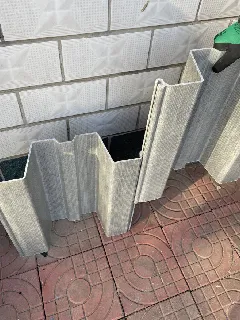loading...
- No. 9, Xingyuan South Street, Dongwaihuan Road, Zaoqiang County, Hengshui, Hebei, China
- admin@zjcomposites.com
- +86 15097380338
- Welcome to visit our website!
fiberglass water storage tank
Understanding Fiberglass Water Storage Tanks
Water storage is a critical aspect of modern infrastructure, and choosing the appropriate tank for water storage can greatly influence efficiency, cost, and maintenance. Among the various materials used for water storage tanks, fiberglass has emerged as a popular choice due to its unique properties and advantages.
Fiberglass, a composite material made from glass fibers and resin, has several beneficial characteristics that make it suitable for water storage. First and foremost, fiberglass tanks are highly resistant to corrosion. Unlike metal tanks that can rust and degrade over time when exposed to water and various chemicals, fiberglass does not suffer from these issues. This longevity means that fiberglass tanks can provide dependable service over many years, reducing the need for frequent replacements.
Another significant advantage of fiberglass water storage tanks is their lightweight nature. Compared to traditional materials such as concrete and steel, fiberglass is much lighter, making it easier to transport and install. This can lead to reduced labor costs and faster installation times, which is particularly beneficial for construction projects that are time-sensitive.
In addition to being lightweight, fiberglass tanks are also versatile. They can be manufactured in various sizes and shapes to fit specific needs, whether for residential, commercial, or agricultural use. This flexibility allows for customized solutions that can optimize space and meet specific water storage requirements. Furthermore, fiberglass tanks can be buried underground or installed above ground, providing additional options for space utilization.
fiberglass water storage tank

Insulation is another critical factor in water storage, especially in regions with extreme temperatures. Fiberglass tanks can be designed with excellent thermal insulation properties, helping to maintain the water temperature. This can be particularly important for agricultural applications or in areas where the water temperature must be regulated to ensure its quality.
One of the concerns with any water storage system is the potential for contamination. However, fiberglass tanks are non-toxic and do not leach harmful chemicals into the water. This characteristic ensures that the water remains clean and safe for consumption, making fiberglass tanks an ideal choice for potable water storage.
Maintenance of fiberglass tanks is also relatively easy. Their smooth surfaces make them less susceptible to the buildup of algae and other contaminants, meaning that cleaning and upkeep can be conducted with minimal effort. Regular inspections can help to ensure that the tank remains in optimal condition, further extending its lifespan.
In terms of cost, while fiberglass tanks may have a higher initial investment compared to some other materials, their longevity, durability, and reduced maintenance costs can lead to significant savings in the long term. Additionally, the versatility of fiberglass allows for broader applications, ultimately making it a cost-effective solution for diverse water storage needs.
In conclusion, fiberglass water storage tanks offer a unique combination of durability, lightweight design, thermal insulation, and reduced maintenance. These features make them an excellent choice for anyone in need of reliable water storage solutions. As the demand for efficient and sustainable water management continues to grow, fiberglass tanks are poised to play an increasingly vital role in various applications, from residential to industrial use. Whether you're looking to store potable water or manage agricultural needs, fiberglass tanks could very well be the solution you are seeking.
-
The Rise of FRP Profiles: Strong, Lightweight, and Built to LastNewsJul.14,2025
-
SMC Panel Tanks: A Modern Water Storage Solution for All EnvironmentsNewsJul.14,2025
-
GRP Grating: A Modern Solution for Safe and Durable Access SystemsNewsJul.14,2025
-
Galvanized Steel Water Tanks: Durable, Reliable, and Ready for UseNewsJul.14,2025
-
FRP Mini Mesh Grating: The Safer, Smarter Flooring SolutionNewsJul.14,2025
-
Exploring FRP Vessels: Durable Solutions for Modern Fluid HandlingNewsJul.14,2025
-
GRP Structures: The Future of Lightweight, High-Performance EngineeringNewsJun.20,2025
